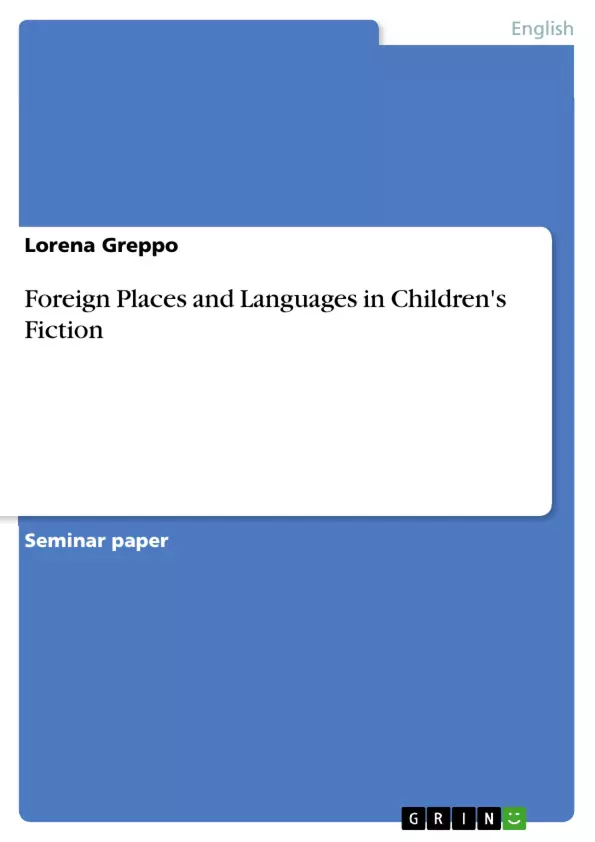The idea that the use of the motif of foreign places and languages in Children’s Fiction is a phenomenon that came up due to globalization sounds evident, but turns out to be misleading. Peter Hunt, Professor Emeritus in Children’s Literature, attributes the interest in foreign cultures to “[…] the desire in the child to comprehend the shape of the world, literally and metaphorically” (Hunt 1994, 179). This has been present in Children’s Literature long time before, most likely in adventure stories and Fantastic Literature, and so the migrant literature is just another way of dealing with it.
In order to find out which effects it has to establish the setting in a place which is unknown to the young readers and to bring them into contact with foreign cultures, I am going to examine four books, written in three different centuries: Mrs. Overtheway’s Remembrances (1869), The Wind Eye (1976), The Granny Project (1983) and The White Darkness (2005). It is interesting to see how this motif works in the mentioned stories, what impact it has on the characters’ life and how it changes them. Therefore I will go further than just describing the relations the protagonists have to the foreign places or languages, but also try to interpret them.
Inhaltsverzeichnis (Table of Contents)
- Introduction
- Main Part
- Mrs. Overtheway's Remembrances
- The Wind Eye
- The Granny Project
- The White Darkness
- Conclusion
Zielsetzung und Themenschwerpunkte (Objectives and Key Themes)
The objective of this work is to explore the impact of foreign places and languages on the characters in four children's books from different centuries. By examining the settings, characters' reactions, and the role of language, the author aims to understand how encounters with the 'other' shape individual perspectives and experiences in children's fiction.
- The influence of foreign places and languages on children's literature
- The impact of cultural encounters on character development
- The role of language in shaping relationships and understanding
- The portrayal of foreign cultures in children's fiction
- The significance of historical context in shaping literary themes
Zusammenfassung der Kapitel (Chapter Summaries)
Mrs. Overtheway's Remembrances
This chapter explores the story of Mary Smith, whose family embraces foreign cultures and teaches her to be tolerant. Her adventures in the Russian-inspired "Reka Dom" house foster a sense of wonder and lead to her eventual marriage. The chapter examines how foreign cultures enrich the lives of characters and provide opportunities for personal growth.
The Wind Eye
The Wind Eye takes readers to Northumberland, where a family travels through time to the 7th century. The chapter contrasts the reactions of different family members to this experience. The father, Bertrand, is arrogant and struggles to communicate with the locals, while the children, Beth and Sally, demonstrate openness and respect for the culture. Their ability to connect with the saint, Cuddy, through non-verbal communication highlights the importance of empathy and understanding in cultural exchange.
Schlüsselwörter (Keywords)
This work explores the key themes of foreign places, languages, and cultural encounters in children's fiction. It examines the impact of these elements on character development, relationships, and the broader understanding of the world. Important keywords include: foreign cultures, cultural exchange, language, communication, childhood, character development, adventure, and historical context.
Frequently Asked Questions
Is the focus on foreign places in children's fiction a new phenomenon?
No, while globalization has made it more evident, the desire to comprehend the world through foreign settings has been present in children's literature for centuries, particularly in adventure and fantastic stories.
Which books are analyzed in this work?
The author examines four books across three centuries: Mrs. Overtheway’s Remembrances (1869), The Wind Eye (1976), The Granny Project (1983), and The White Darkness (2005).
How does cultural encounter shape character development?
Encounters with the "other" challenge characters' perspectives, forcing them to grow through experiences of tolerance, wonder, or struggle with cultural differences.
What role does non-verbal communication play in "The Wind Eye"?
In "The Wind Eye," children connect with a 7th-century saint through non-verbal communication, highlighting empathy as a bridge in cultural exchange when language fails.
How does the setting "Reka Dom" influence Mary Smith?
In "Mrs. Overtheway’s Remembrances," the Russian-inspired house "Reka Dom" fosters a sense of wonder and tolerance, enriching her life and eventual personal growth.
- Arbeit zitieren
- Lorena Greppo (Autor:in), 2011, Foreign Places and Languages in Children's Fiction, München, GRIN Verlag, https://www.grin.com/document/192563



